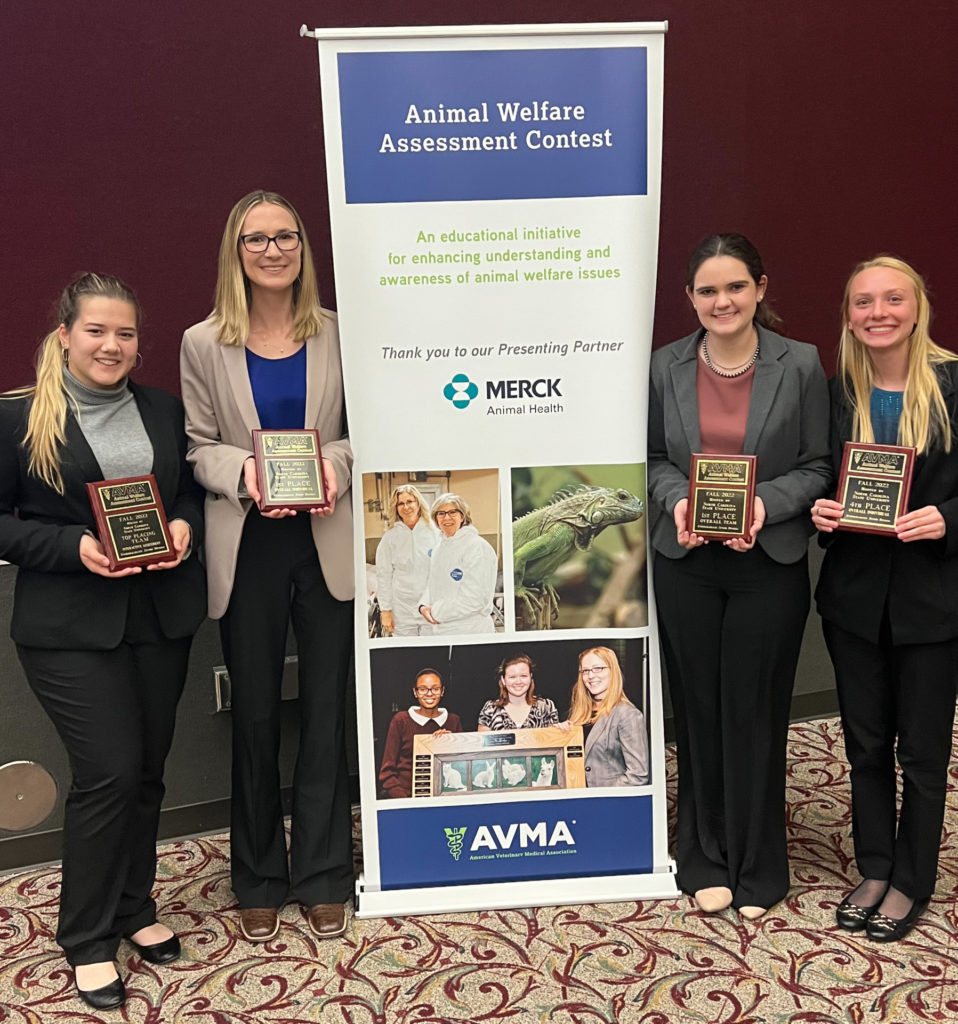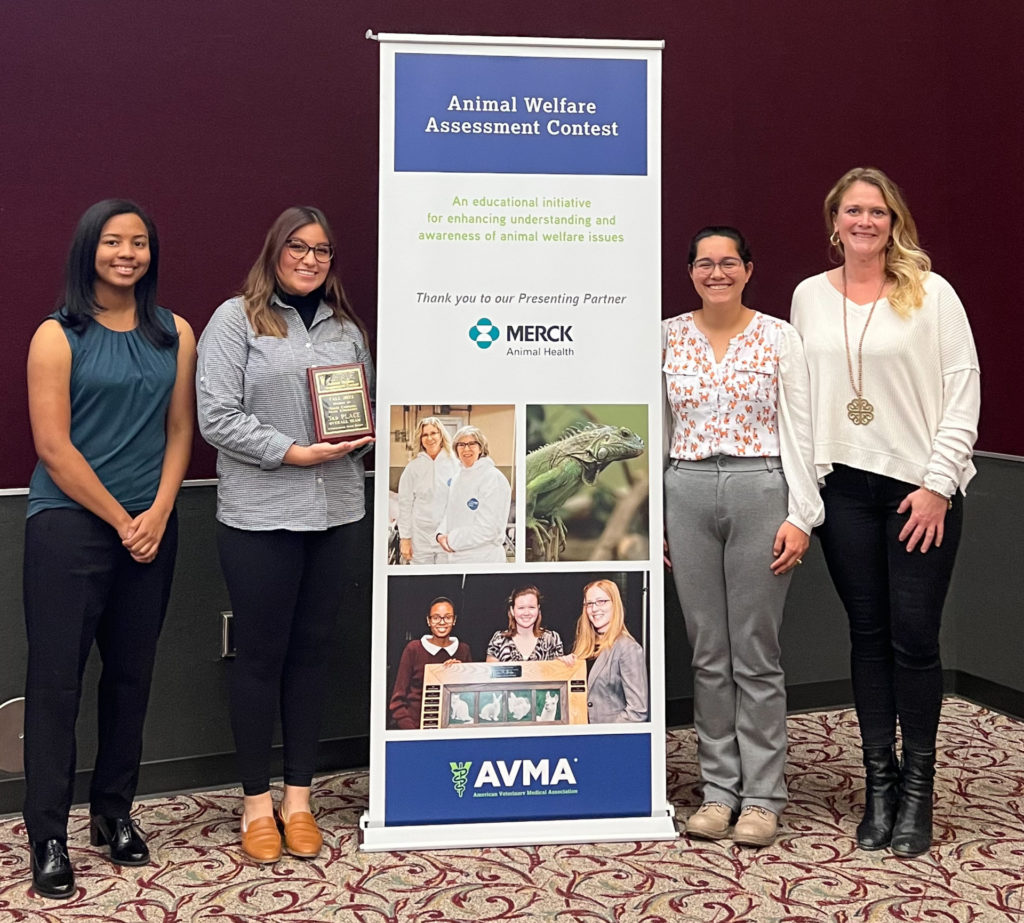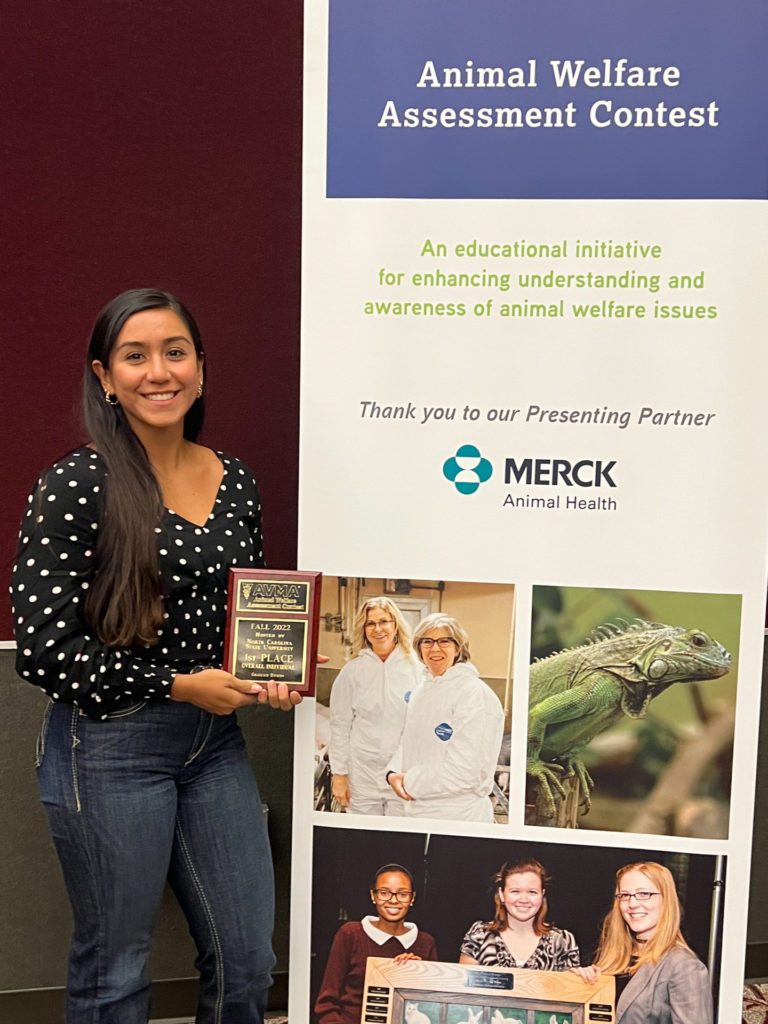Texas A&M Animal Welfare Judging Team claims national wins
Top team and top individual rankings at 22nd annual Animal Welfare Assessment Contest in Raleigh, North Carolina
The Texas A&M University Animal Welfare Judging Teams competed in the 22nd annual Animal Welfare Assessment Contest, AWJAC, claiming top team and individual wins in the contest held at North Carolina State University in Raleigh, North Carolina, Nov. 18-20.

The AWJAC contest is the only welfare judging contest held for universities. As a competitive team in the College of Agriculture and Life Sciences Department of Animal Science, the Texas A&M Animal Welfare Judging Team won first and third place in the undergraduate team division.
The seven undergraduate students from Texas A&M were split into two teams for the contest based on classification. The first-place team overall in the undergraduate junior division included Erin Stockland ’25, Missouri City; JadaLea Isles ’25, Bryans; Jillian Gordon ’26, Katy; and Isabella Fonseca ’26, Missouri City. This team also placed as the top team in the live assessment category.
The third-place team overall in the undergraduate junior division included Cora Schell ’23, Round Rock; Aarayanna Jones ’23, Missouri City; and Emma Fuentes ’25, Austin.

Individually, the students also took home high honors. Stockland claimed first for the second year in a row, following her win as a freshman in the 2021 contest, while Gordon placed fourth. In the graduate division, Guadalupe Ceja, a first-semester doctoral student from Alice, placed first individually.
“This was a phenomenal group of students to work with,” said Texas A&M animal welfare judging team coach Courtney Daigle, Ph.D., an assistant professor of animal welfare in the department. “They were open-minded, asked questions, were willing to take risks and have fun. Four of the students had never competed previously, yet they all brought different strengths to the teams. Part of a winning strategy is to have multiple viewpoints on the same team.”
Learning science-based assessment methods
The AWJAC, which began in 2001 and is coordinated by the American Veterinary Medical Association, aims to provide students with an educational opportunity to assess animal welfare in various settings using science-based methods and reasoning. Like other competitive team contests, students strengthen their vocabulary, reasoning and communication skills by competing.
The contest includes three divisions: undergraduate, graduate and veterinary students. The contest is also open to practicing veterinarians as a pathway to earn continuing education credit. Initially created to focus on livestock species, the contest expanded to cover production, companion, laboratory and exotic animals.
A total of 225 registrants from 23 universities across North America competed in the 2022 contest. Each university is allowed to take a maximum of 15 students, with three to five students per team. Most students on the Texas A&M judging team are animal science majors, but one member is majoring in agricultural education, and another is a dual major in animal science and biomedical sciences. Daigle offers an undergraduate course in animal welfare judging, ANSC 289, but team members are not required to be enrolled in the class to participate in the contest.
The contest presents students with hypothetical, realistic computer-viewed scenarios that outline animal performance, health, physiologic and behavioral data. Students evaluate these scenarios individually to determine which facility has a higher level of welfare and present their rationale orally to judges who have expertise in animal welfare science and knowledge of the specific species.
The team assessment is conducted at an operating animal facility where students present recommendations for changes to the facility that would better promote animal welfare. According to the contest website, the AWJAC “teaches students to integrate science-based knowledge with ethical values for an interdisciplinary approach to problem-solving.”
Students are expected to assess the welfare of all aspects of each species presented, including transportation, housing, health, training, retirement, production and slaughter/euthanasia. Each year, the species evaluated in the contest changes. The 2022 assessment included show chickens, full-fed dairy beef, an octopus in an aquarium and a live/on-site evaluation of dogs and cats in an animal shelter.
“The judging contest is a wonderful opportunity for students to develop their critical thinking and reasoning skills, refine their observation skills, practice orally communicating scientific information within an ethical framework and build their network with industry and academic leaders within the veterinary and animal welfare fields,” explained Daigle.
Gaining real-world experience
To prepare for the contest, the team interacted with various industry professionals and facilities associated with the species to be evaluated in the 2022 contest.
The team visited TAMU Galveston and the Moody Gardens Aquarium to prepare for the octopus evaluation; STgenetics in Navasota, for dairy-beef; Aggieland Humane Society and the TAMU Comparative Medicine Program for animal shelter; and the Texas A&M Department of Poultry Science to learn more about show chickens. The team also prepared by meeting once a week to conduct practice scenarios, develop and deliver reasons, and discuss how to link science with ethics.
Being part of the animal welfare judging team is a great challenge for students, as they must learn about several species they may not be familiar with, Daigle said. The preparation for this contest also requires teaching ethical decision-making, empathy, how to connect the scientific literature to real situations and how to perceive the world through the lens of the animal.
Continuing a history of success
Daigle has coached the Texas A&M animal welfare judging team since its inception in 2017, and after the team’s inaugural showing, they have placed each year since participating in the competition. The success of this year’s team solidifies Texas A&M as a leader in animal welfare judging and assessment, said Daigle.
“We are proud of our students’ success at the recent animal welfare assessment contest,” said Andy Herring, Ph.D., interim head of the Department of Animal Science. “They represented the department and Texas A&M University well. Animal Welfare Assessment is one of the newer competitive teams in the department, and we are excited about the program’s continued success.”
A new Texas A&M team will be determined next fall semester and will defend their title in the 2023 contest at the University of Wisconsin-River Falls.
—



